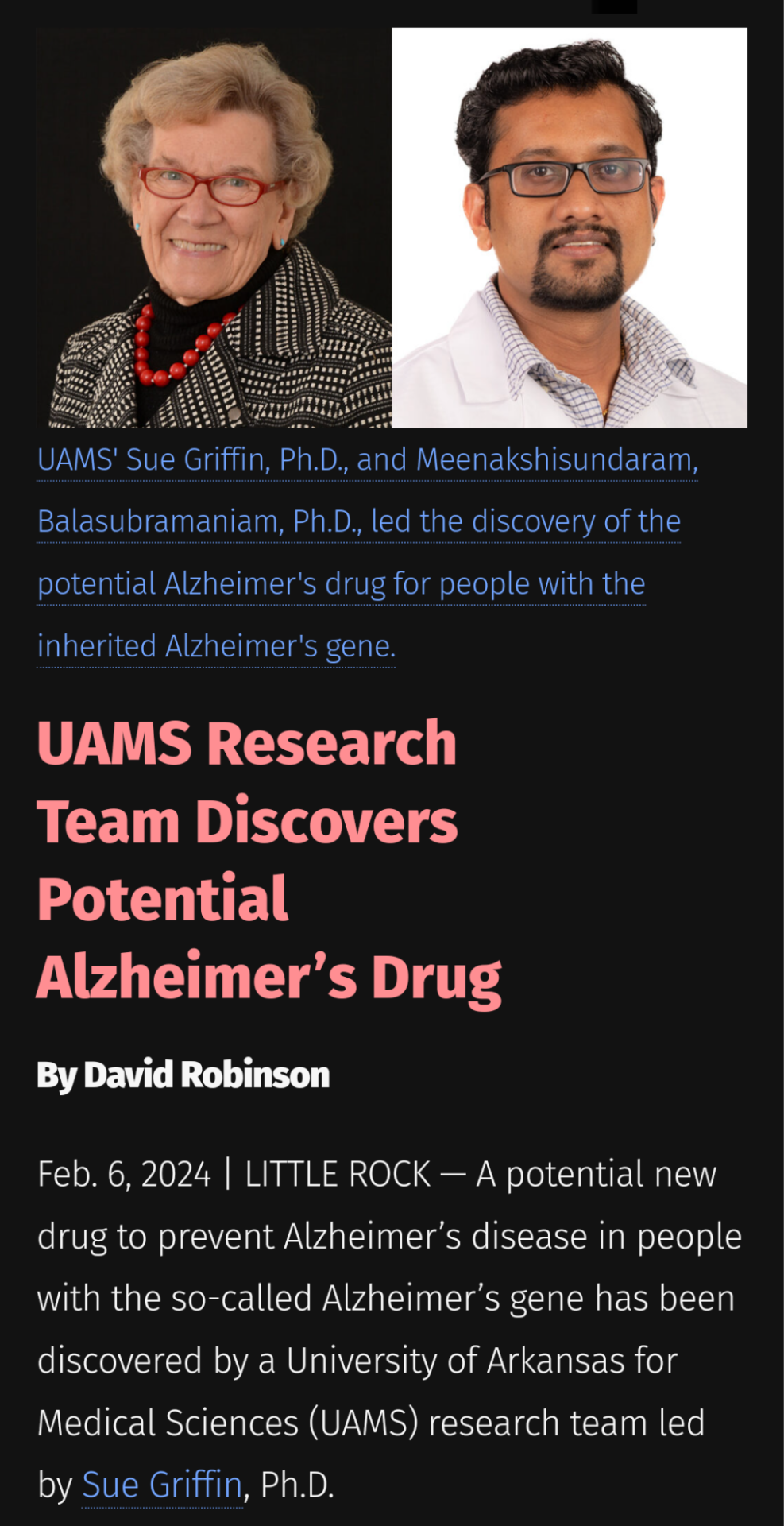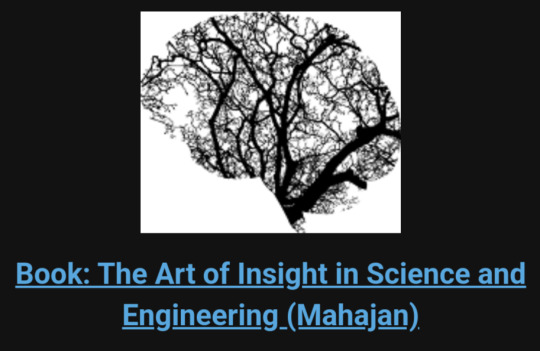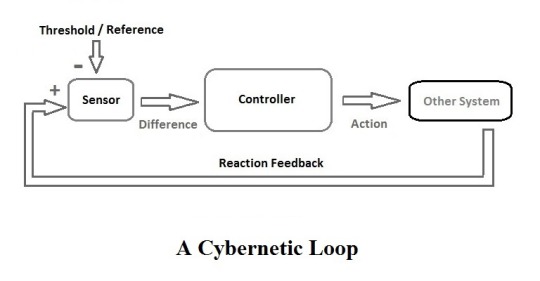Text
Be your own master
You may have seen this ad:

You don't need any of that shit in your brain.
Don't be a sicko druggo.
Regardless of the legal status of narcotics. This has to do with you, not the law.
Be master of your own destiny.
3 notes
·
View notes
Text
Promising discovery for Alzheimer's treatment


The findings were published on 8 Jan 2024 in Communications Biology and include discoveries of a druggable target and a drug candidate, made by Meenakshisundaram Balasubramaniam, Ph.D., the paper’s first author.
An estimated 50-65% of people with Alzheimer’s disease have inherited the Alzheimer’s gene, Apolipoprotein E4 (APOEε4), from one or both parents. About 25% of people have one copy of APOEε4 and are three times as likely to develop the disease. Those with two copies (one from each parent) make up 2-3% of the population and are 12-15 times as likely to develop Alzheimer’s.
Balasubramaniam, co-principal investigator on the NIH grant with Griffin, said UAMS built the first known full-length structure of APOEε4 protein in 2017, which he created using bioinformatics and computational modeling techniques. This foundational work led to the discovery of the druggable site on the APOEε4 protein, ApoE4. (APOEε4 refers to the gene, and ApoE4, without the epsilon symbol and no italics, is the protein.)
Balasubramaniam’s unique skills and curiosity, Griffin said, were the catalyst for the discoveries. “I don’t know of anyone else in the world but Dr. Balasubramaniam who can do the work that’s in this paper,” Griffin said of the assistant professor and Inglewood Scholar in the Department of Geriatrics.
Other research team members listed in the USMS article.
UAMS
Related story: The Despair of Persons Living With Alzheimer’s Disease by Jason Karlawish at The History Reader
1 note
·
View note
Note
So animals have culture?
Cultural practices in non-human animals have been observed for decades, the only reason it isn't more widely recognised is because of the anthropocentrism that is so prevalent in the sciences. Many animals have been observed mourning, creating art, giving gifts, decorating their spaces, establishing and adhering to fashions, enjoying music, developing language, using tools and engaging in ritualistic behaviours, all of which are clear indicators of culture.
It isn't just mammals either, such behaviours are commonly observed across the animal kingdom, including birds, reptiles, fish and insects. Non-human animals often behave in ways that bare striking resemblance to our own cultural practices, especially around mourning, we have just always dismissed these as 'instinctive' under the false assumption that culture is unique to the human animal.
Of course, we also have a significant vested interest in denying animal intelligence, emotion and culture. The more animals resemble us and the more complex they are, the harder it is to justify exploiting them, even under existing ethical systems that don't generally consider animals who aren't pets to be very important. It's harder to eat a pig when you have seen them decorate their barn with flowers, as has been observed in sanctuaries.
If you'd like to read more about this, I'd recommend checking out The Emotional Lives of Animals. You can find a few good articles below as well:
New Scientist
Science.org
Science.org 2
Psychology Today
200 notes
·
View notes
Text
Systems simulation is a powerful tool of systems science.
Computer Simulation
As real as it gets
Reality - Tenerife 1977
youtube
Video Simulation
youtube
2 notes
·
View notes
Text
There is only Palestine from the River unto the Sea.
Israel will cease to exist.

from the river to the sea, palestine will be free.
pattern here
450 notes
·
View notes
Text
Sentient beings. Animal rights.

There’s a lot to be learned by studying the mental lives of these creatures,” says Christopher Krupenye, a Johns Hopkins University psychologist who explores cognition in humans and more traditional animal models such as chimpanzees and dogs. Ignoring livestock, he says, has been a “missed opportunity” by the scientific community.
Full article here.
43 notes
·
View notes
Text
World's favorite constellation

Orion, the Hunter, in the eastern sky before dawn
(c) riverwindphotography, late August 2023
1K notes
·
View notes
Text
Stanford Online
Learning for a Lifetime. Free.

Browse Free Online Courses

Browse Content Gallery

Browse SEP
» Site map
0 notes
Text
The Limits to Growth

The classic system dynamics world growth simulation that shook —and keeps on shaking— the world.
The Limits to Growth is a 1972 report that discussed the possibility of exponential economic and population growth with finite supply of resources, studied by computer simulation. The study used the World3 computer model to simulate the consequence of interactions between the earth and human systems. The model was based on the work of Jay Forrester of MIT, as described in his book World Dynamics. Commissioned by the Club of Rome, the findings of the study were first presented at international gatherings in Moscow and Rio de Janeiro in the summer of 1971. The report's authors are Donella H. Meadows, Dennis L. Meadows, Jørgen Randers, and William W. Behrens III, representing a team of 17 researchers. The report concludes that, without substantial changes in resource consumption, "the most probable result will be a rather sudden and uncontrollable decline in both population and industrial capacity".
— Wikipedia
Read/Download Limits — DonellaMeadows.org
The Limits to Growth+50 — Club of Rome
The Limits to Growth after 50 — Resilience.org

World3 model standard run adapted from Limits printout Fig. 35, p. 124. By YaguraStation, CC 4.0, Wikimedia Commons
» Site map
0 notes
Text
LibreTexts Open Access Textbooks


Download/Read BES/Richards


Download/Read ICS (Iqbal)

Download/Read DSC (DDV)

Download/Read TAISE (Mahajan)

Download/Read BLSP (Standridge)
» Site map
0 notes
Text
Principia Cybernetica

Principia Cybernetica is an international cooperation of scientists in the field of cybernetics and systems science, especially known for their website, Principia Cybernetica. They have dedicated their organization to what they call "a computer-supported evolutionary-systemic philosophy, in the context of the transdisciplinary academic fields of Systems Science and Cybernetics".
PCW is the website of the Principia Cybernetica Project (PCP), an international organization. The Project aims to develop a complete philosophy or "world-view", based on the principles of evolutionary cybernetics, and supported by collaborative computer technologies. To get started, there is an introduction with background and motivation, and an overview, summarizing the project as a whole.
Principia Cybernetica Web
» Site map
0 notes
Photo
» Sys•Cyber site map

57K notes
·
View notes
Text
Cybernetics & Systems

Cybernetics and Systems is a peer-reviewed, open source scientific journal of cybernetics and systems science, including artificial intelligence, computer science, cybernetics, human computer intelligence, information and communication technology, machine learning, and robotics.
The journal was established in 1971 as Journal of Cybernetics and obtained its current title in 1980. It is published by Taylor & Francis in cooperation with the Austrian Society for Cybernetic Studies.
Cybernetics and Systems (journal)
» Site map
0 notes
Text
American Society for Cybernetics


The American Society for Cybernetics (ASC) is an American non-profit scholastic organization for the advancement of cybernetics as a science , a discipline, a meta-discipline and the promotion of cybernetics as basis for an interdisciplinary discourse. The society does this by developing and applying cybernetics’ concepts which are presented and published via its conferences and peer-reviewed publications. As a meta-discipline, it creates bridges between disciplines, philosophies, sciences, and arts. The ASC is a full member of the International Federation for Systems Research (IFSR).
ASC
» Site map
0 notes
Text
Systems & Cybernetics Site Map & Web Stuff

IconArchive.com
Diego Azeta blogs:
» Sys•Cyber ✴️🔆✴️ The real cybernetics
» Diego•Azeta 🌐 Azeta Azota
» La•Colonia 🇵🇷 World's oldest colony*
*World's most experienced colony (®Pan Am™)
Sys•Cyber ✴️🔆✴️ blog:
American Society for Cybernetics
Cognitive Science Society
International Society for Systems Sciences
Fractal self-similarity
Principia Cybernetica
Simulation Modeling Software Analyze • Visualize • Optimize
AnyLogic - agent-based modeling (ABM), discrete event simulation (DES), system dynamics (SD) modeling
NetLogo - ABM development environment
Mesa - Python ABM
AgentPy - Python ABM library
Simantics System Dynamics - open source SD modeling & simulation software
Insight Maker - ABM & SD online simulation
Systems Dynamics Society - core software
Systems Dynamics Society - web-based tools
Capterra - best free simulation software
Online Resources
Computer Modeling and Simulation by Ángel A. Juan Pérez, Open University of Catalonia. A brief overview of DES. (PDF)
Gentle Intro Discrete Event Simulation
Intro Discrete Event Simulation (PDF)
Intro to Modeling and Analysis of Complex Systems by Hiroki Sayama, SUNY Binghamton
Complexity - Wikipedia
Complex System - Wikipedia
Principles of Systems Science - U Wash PDF
Systems Theory - Wikipedia
Cybernetics and Systems (open journal)
International Encyclopedia of Systems and Cybernetics 2e
The Limits to Growth - The classic world sim, now more relevant than ever. 🌟🌟🌟🌟🌟
System Dynamics - Wikipedia
What Is System Dynamics - SD Society
Intro System Dynamics - MIT OCW
The Beginnings of SD - Jay W. Forrester
Mathematics of SD - Worcester Polytechnic
Descriptive Statistics - Bhandari @ Scribbr
Inferential Statistics - Bhandari @ Scribbr
Descriptive vs inferential Statistics - by Zach @ Statology
Bayesian Statistics - Wikipedia
Bayesian Statistics & Modeling - Gelman
Open Access Textbooks 📚
OAT Resource Directory - U Buffalo
Directory of Open Access Books
Math Open Textbooks - AI Math
LibreTexts
• LibreTexts Systems Engineering
Open Textbook Library
OpenStax
OER Commons Open Textbooks
Milne Open Textbooks - SUNY
IntechOpen Books
Merlot Materials
Saylor Academy Open Textbooks
Find e-Books/Books in general:
Guide to e-Books - UC Berkeley
18 Free e-Book Sites - Lifewire
Index of Books - Google Books
Open Library - Internet Archive
Lifelong Learning - Free
Carnegie-Mellon Open Learning
MIT Open Learning
Open Michigan
Open Yale
Stanford Online
Systems Pre/Co-reqs
Recommended for learners of systems science, cyber systems analysis, and cyber systems engineering. Work at your own pace.
Probability & Statistics
Probability & Statistics - Carnegie-Mellon OLI
Intro Probability & Statistics - MIT OCW
• Introductory Statistics with Randomization and Simulation (Open Textbook Library)
• Intro Bayesian Statistics - Rice, U Wash
Linear Algebra
Linear Algebra - Strang, MIT OCW
• Linear Algebra (text) - Pinkham, Columbia
• Understanding Linear Algebra - Austin
Python Programming
🌟 PythonAnywhere - Online IDE
• Getting Started Python - Michigan Online
• Think Python 2e - Downey
• Intro Computer Science Python - MIT OCW
• Python online tutorial - Google
• Core Python Tutorials - Real Python.com
Linear Programming
Linear Programming (basic ideas) - OU
• LP (basic ideas) mini-text (PDF) - OU
Economics
Microeconomics - Gruber, MIT OCW
• Intermediate Microeconomics - Emerson
Game Theory
• Game Theory - Open Yale Courses
• Game Theory - Stanford Online
• Game Theory 101 video course - Spaniel
Logic
• Logic & Proofs - Carnegie-Mellon OLI
• Logic I - MIT OCW
• Intro Logic and Critical Thinking (text) - Van Cleave, OTL
Systems Thinking
• Systems Thinking Books - Goodreads
• Intro Systems Thinking - UN ESCAP (PDF)
• Introduction to Industrial Engineering by Bonnie Boardman, U Texas at Arlington
Calculus & Differential Equations
Calculus Made Easy - An elegant introduction
Coursera Calculus courses
edX Calculus courses
MIT Calculus courses - MIT OCW
Diffy Qs: Differential Equations for Engineers - Jiří Lebl (textbook)
Differential Equations: An Introduction for Engineers - Matthew Charley (textbook)
Differential Equations - U Toronto (PDF)
You need not be an expert at solving DEs to work productively in cyber systems analysis. SD simulation software do that automatically with built-in numerical algorithms. But you should know what the DE means and does in the model. The same holds true for other technical details, such as random number generation and statistical measures, in different modeling and simulation paradigms. The conceptual ideas must be well understood; the computational aspects are best delegated to the modeling platform.
Thought of the day: Investing your time in becoming conversant with cybernetic system analysis methods is far superior to wasting it watching TV.
Cyber systems analysts think much better than non-analysts and are excellent at multi-factor problem solving, enterprise or institutional policy design, and strategic decision making. They are skilled in transforming conceptual insights into effective operational solutions.
Cyberneticians were key to the rise of cognitive science as a modern scientific discipline. They were pivotal in overcoming resistance to new ideas in psychiatry and psychology, especially in doctrinaire behaviorism.
Traditional fields of inquiry are often biased by conceiving problems and proposed solutions solely from their disciplinary perspective. This can turn out to be a hindrance. Cyber systems analysis is trans-disciplinary and eclectic. As such it tends to be more open in recognizing issues and ascertaining workable solutions to complex real-world problems.
If you want to change the world without waiting forever for change to happen, consider using cybernetic systems analysis. Effective results. Efficient and functional. Less prone to risk yet significantly more cost effective than traditional organizational reform approaches.
0 notes
Text
» Sys•Cyber ✴️🔆✴️ Site Map
Systems

Basic IPO System with feedback — O'Reilly.com
A system is a group of interacting or interrelated elements that act according to a set of rules to form a unified whole. A system, surrounded and influenced by its environment, is described by its boundaries, structure and purpose and is expressed in its functioning. Systems are the subjects of study of systems theory and other systems sciences. Systems have several common properties and characteristics, including structure, function, behavior and interconnectivity.
— Wikipedia


Dr. Shailendra Singh Thakur, Professor at Gyan Ganga Group of Institutions, Jabalpur, India. See Dr. Thakur's complete System Engineering course slides here.
Life was simple before World War II. After that, we had systems.
— Grace Murray Hopper
Cybernetics

Cybernetic feedback loop by Baango, CC 4.0 Wikimedia Commons
Cybernetics is a wide-ranging field concerned with circular causal processes such as feedback. Norbert Wiener named the field after an example of circular causal feedback — that of steering a ship where the helmsman adjusts their steering in response to the effect it is observed as having, enabling a steady course to be maintained amongst disturbances such as cross-winds or the tide. Cybernetics is concerned with circular causal processes however they are embodied, including in ecological, technological, biological, cognitive and social systems and also in the context of practical activities such as designing, learning, managing, etc. Its transdisciplinary character has meant that cybernetics intersects with a number of other fields, leading to it having both wide influence and diverse interpretations.
— Wikipedia

Cybernetic feedback loop by Orzetto, CC 4.0 Wikimedia Commons
What Are Cybernetics and Systems Science? Principia Cybernetica Web
Heinz von Foerster once told Stuart Umpleby that Norbert Wiener preferred the term "cybernetician" rather than "cyberneticist", perhaps because Wiener was a mathematician rather than a physicist.
3 notes
·
View notes